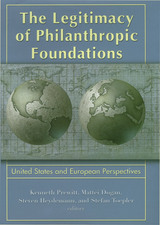4 books about European Perspectives

The Financing of Politics
Latin American and European Perspectives
Edited by Carlos Malamud and Eduardo Posada-Carbo
University of London Press, 2004
This volume stresses the need for a comparative approach when dealing with the funding of party politics and a major related aspect - corruption. This topic lies at the heart of any realistic discussion of the logic of democratic representation. Corruption, or the perception of corruption, has led to an ever-increasing concern with political financing. In some cases the trend is toward a greater role for the state in financing political parties, in others the reverse is true. In this collection the individual experiences of several Latin American countries (including Chile, Colombia, Mexico, Uruguay, and Venezuela) are examined against the background of Western Europe, with a view to identifying similarities as well as differences. Given the centrality of political parties to liberal democracies, this subject is of great significance.
Contributors include Angel Alvarez (Universidad Central, Venezuela), Kevin Casas Zamora (University of Costa Rica), Fernando Cepeda Ulloa (Universidad de los Andes, Colombia), Pilar del Castillo (Spanish Minister of Education), Justin Fisher (University of Brunel), Manuel Antonio Garreton (University of Chile), Emilio Lama de Espinosa (Real Instituto Espanol Elcano de Relaciones Internacionales y Estrategicas, Madrid, Spain), Juan Molinar Horcasitas (Partido de Accion Nacional, Mexico), Michael Pinto-Duschinsky (University of Brunel), Weronique Pujas (University of Grenoble, France), Martin Rhodes (European University Institute, Florence, Italy), Diego Urbaneja (Universidad Central, Venezuela), and Laurence Whitehead (Nuffield College, University of Oxford, UK).
Contributors include Angel Alvarez (Universidad Central, Venezuela), Kevin Casas Zamora (University of Costa Rica), Fernando Cepeda Ulloa (Universidad de los Andes, Colombia), Pilar del Castillo (Spanish Minister of Education), Justin Fisher (University of Brunel), Manuel Antonio Garreton (University of Chile), Emilio Lama de Espinosa (Real Instituto Espanol Elcano de Relaciones Internacionales y Estrategicas, Madrid, Spain), Juan Molinar Horcasitas (Partido de Accion Nacional, Mexico), Michael Pinto-Duschinsky (University of Brunel), Weronique Pujas (University of Grenoble, France), Martin Rhodes (European University Institute, Florence, Italy), Diego Urbaneja (Universidad Central, Venezuela), and Laurence Whitehead (Nuffield College, University of Oxford, UK).
[more]

An Introduction to Immigrant Incorporation Studies
European Perspectives
Edited by Marco Martiniello and Jan Rath
Amsterdam University Press, 2014
Focusing mainly on the European experience including Eastern Europe, this important volume offers an advanced introduction to immigrant incorporation studies from a historical, empirical and theoretical perspective. Beyond incorporation theories, renowned scholars in the field explore incorporation in action in different fields, policy issues and normative dimensions.
[more]

An Introduction to International Migration Studies
European Perspectives
Edited by Marco Martiniello and Jan Rath
Amsterdam University Press, 2013
Focusing mainly on the European experience including Eastern Europe, this important volume offers an advanced introduction to immigrant incorporation studies from a historical, empirical and theoretical perspective. Beyond incorporation theories, renowned scholars in the field explore incorporation in action in different fields, policy issues and normative dimensions.
[more]

Legitimacy of Philanthropic Foundations
United States and European Perspectives
Kenneth Prewitt
Russell Sage Foundation, 2006
Though privately controlled, foundations perform essential roles that serve society at large. They spearhead some of the world's largest and most innovative initiatives in science, health, education, and the arts, fulfilling important needs that could not be addressed adequately in the marketplace or the public sector. Still, many people have little understanding of what foundations do and how they continue to earn public endorsement. The Legitimacy of Philanthropic Foundations provides a thorough examination of why foundations exist and the varied purposes they serve in contemporary democratic societies. The Legitimacy of Philanthropic Foundations looks at foundations in the United States and Europe to examine their relationship to the state, the market, and civil society. Peter Frumkin argues that unlike elected officials, who must often shy away from topics that could spark political opposition, and corporate officers, who must meet bottom-line priorities, foundations can independently tackle sensitive issues of public importance. Kenneth Prewitt argues that foundations embody elements of classical liberalism, such as individual autonomy and limited government interference in private matters and achieve legitimacy by putting private wealth to work for the public good. Others argue that foundations achieve legitimacy by redistributing wealth from the pockets of rich philanthropists to the poor. But Julian Wolpert finds that foundations do not redistribute money directly to the poor as much as many people believe. Instead, many foundations focus their efforts on education, health, and scientific research, making investments that benefit society in the long-term, and focusing on farsighted issues that a myopic electorate would not have patience to permit its government to address. Originating from private fortunes but working for the public good, independently managed but subject to legal prescriptions, philanthropic foundations occupy a unique space somewhere between the public and private sectors. The Legitimacy of Philanthropic Foundations places foundations in a broad social and historical context, improving our understanding of one of society's most influential—and least understood—organizational forms.
[more]
READERS
Browse our collection.
PUBLISHERS
See BiblioVault's publisher services.
STUDENT SERVICES
Files for college accessibility offices.
UChicago Accessibility Resources
home | accessibility | search | about | contact us
BiblioVault ® 2001 - 2025
The University of Chicago Press









